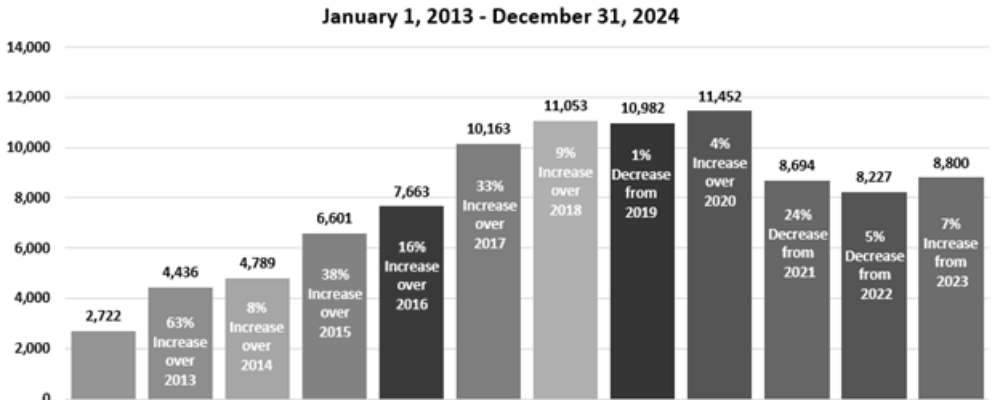Seyfarth Synopsis: In its seminal decision, Bostock v. Clayton County, Georgia, the Supreme Court held that discrimination on the basis of sexual orientation or gender identity is tantamount to discrimination on the basis of sex. Employers are just beginning to grasp the wide-ranging impact that decision will have on the American workplace. The reasoning of this decision: that to treat an employee differently because of the sex of the person they are married to, for example, is necessarily the same as treating that person differently because of their sex, is turning out to have important implications for other areas of the law, including equal pay claims. Just one more thing for employers to beware of as they attempt to navigate the modern, culturally-charged workplace.
***
This is the second in a series of posts examining the new and developing trends in equal pay litigation identified in Seyfarth’s yearly publication, Developments in Equal Pay Litigation, 2024 Update.
In order to state a viable equal pay claim, a plaintiff need not show they were paid less in strictly monetary terms. Any discrepancy with respect to compensation or benefits can support such a claim. For example, one recent case turned on the fact that one senior executive was denied the use of a company car while others were not. The court in that case held that those facts were sufficient to state a prima facie equal pay violation, even though the complaining executive earned the same base salary as her comparators. See Pate v. Med. Diagnostic Labs. LLC, No. 7:19-cv-126-FL, 2021 WL 965906 (E.D.N.C. Mar. 15, 2021).
But when a disparity in benefits forms the basis of a gender discrimination claim, it is critical that a plaintiff establish their right to those benefits. This issue potentially puts equal pay litigation on a collision course with some of those most culturally contentious issues of the day. In Bostock v. Clayton County, Georgia, 590 U.S. 644 (2020) the Supreme Court held that Title VII prohibits discrimination on the basis of sexual orientation or gender identity because those forms of discrimination are tantamount to discrimination on the basis of sex. That decision has rendered many workplace issues newly relevant, including the question of who qualifies for spousal benefits. That, in turn, threatens to give rise to whole new categories of equal pay violations.
This was the issue in one recent case, Doe v. Catholic Relief Services, 618 F. Supp. 3d 244 (D. Md. 2022). In that case, the plaintiff worked for a religiously aligned organization. He alleged he was underpaid compared to his peers because certain health benefits were denied to his spouse, another man, even though they were provided to the opposite-sex spouses of others in the same position. He claimed this was a violation of Title VII and the EPA (among other laws) because it amounted to providing health benefits to women employees, which covered their male spouses, while denying those benefits to male employees who also happen to have male spouses. Some would argue this reasoning shares some affinity with the reasoning underlying Justice Gorsuch’s opinion in Bostock, i.e., that treating someone differently because of their sexual orientation (or gender identity) is really the same thing as treating them differently because of their sex.
The religious organization employer argued that it retained its religious character by, among other things, maintaining a code of conduct and administering its employee benefits program consistently with its religious values. It argued that those values prevented it from providing spousal benefits to employees’ same-sex spouses. Referencing the Bostock decision, the court held: “When an employer discriminates against an employee based on sexual orientation, ‘it necessarily and intentionally discriminates against that individual in part because of sex. And that is all Title VII has ever demanded to establish liability.’” Id. at 252 (quoting Bostock, 590 U.S. at 665).
The court then had to delve into the complicated relationship between anti-discrimination statutes and religious rights, which is not usually an issue in equal pay litigation. The employer tried several different arguments to escape the reasoning of Bostock. First, it argued that it fell within Title VII’s exception for religious entities. But the court held that the relevant provision, § 702(a), was meant to allow religious organizations to hire only individuals of the same religion; it did not provide blanket protection for religious organizations to discriminate against those who do not share particular beliefs or standards tied to its religious identity. “A plain reading of § 702(a) reveals Congress’s intent to protect religious organizations seeking to employ co-religionists, but the reading urged by [employer] would cause a relatively narrowly written exception to swallow all of Title VII, effectively exempting religious organizations wholesale.” Id. at 253.
The employer also argued that it was protected by the Religious Freedom Restoration Act (“RFRA”). That statute provides that “a person whose religious exercise has been burdened in violation of this section may assert that violation as a claim or defense in a judicial proceeding and obtain appropriate relief against a government.” 42 U.S.C. § 2000bb-1(c)). The Doe court noted that the Supreme Court had not given clear guidance regarding Title VII’s interaction with the RFRA. However, the court held that the plain language of RFRA was directed at restricting activities of the government that might substantially burden the free exercise of religion; it was not directed at private parties. “This court finds as a matter of law that RFRA restricts the government rather than private parties, and so [employer] may not assert RFRA as an affirmative defense against [plaintiff’s] claims.” Id. at 254.
Finally, the court held that both Title VII and the EPA were generally applicable laws that did not selectively burden religiously motivated conduct while exempting comparable secularly motivated conduct, and so did not violate the Free Exercise clause of the First Amendment. The court concluded: “Our Constitution’s solicitousness of religious exercise is not carte blanche for any religious institution wishing to place itself beyond the reach of any neutral and generally applicable law.” Id. at 256. But, in a move that demonstrates the novelty of these issues, the court certified two questions for decision by the Maryland Supreme Court: whether the Maryland Equal Pay for Equal Work Act (“MEPEWA”) prohibits discrimination on the basis of sexual orientation, and whether the Maryland Fair Employment Practices Act (“MFEPA”) allows certain religious organizations to discriminate because of sexual orientation. See Doe v. Catholic Relief Servs., No. 20-cv-1815, 2023 WL 155243 (D. Md. Jan. 11, 2023).[1]
Implications For Employers
This is only one case defining Bostock’s impact on the American workplace. And it does not even address what is arguably the most fundamental question in this context; namely, does the EPA prohibit discrimination in pay on the basis of sexual orientation or gender identity? If such discrimination is always tantamount to sex discrimination, then, arguably, the EPA would sweep within its ambit instances where LGBTQ individuals are paid more or less than their non-LGBTQ comparators for equal work. But some might argue that the language of the EPA—which specifically prohibits disparities in pay between “employees of the opposite sex”—is not as conducive to this type of interpretation as the “because of sex” or “on the basis of sex” language found in Title VII and some other statues. Nevertheless, as the Doe case demonstrates, such an interpretation may not even be necessary to raise issues regarding coverage under the EPA. Bostock remains a critically important decision that all employers should monitor with care.
These and other trends impacting equal pay litigation are discussed in much greater detail in Seyfarth Shaw’s yearly report, Developments in Equal Pay Litigation, 2024 Update. We highly recommend that report to any employer facing equal pay litigation, or to those who just want to know more about it so they can avoid such lawsuits in the future or keep abreast of changes in the law. We look forward to continuing to share our analysis of these issues.
[1] While beyond the scope of this article, the Maryland Supreme Court answered on August 23, 2023, holding that “the prohibition against sex discrimination in MFEPA does not prohibit discrimination on the basis of sexual orientation. MFEPA prohibits sexual orientation discrimination based on its specific enumeration of ‘sexual orientation’ as a protected class,” that “[a]dding sexual orientation as a protected category in MEPEWA will require . . . legislative action,” and that that “the General Assembly intended to exempt religious organizations from these kinds of MFEPA claims brought by employees who perform duties that directly further the core mission (or missions) of the religious entity.” Doe v. Catholic Relief Servs., 484 Md. 640, 660-61, 664, 667 (Md. 2023).
“With approximately 900 lawyers across 17 offices, Seyfarth Shaw LLP provides advisory, litigation, and transactional legal services to clients worldwide.”
Please visit the firm link to site






